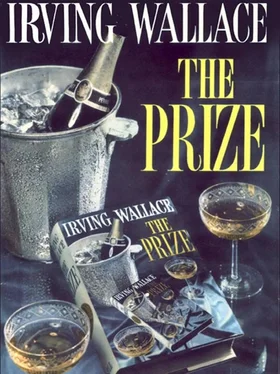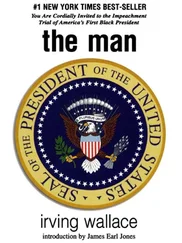He relaxed, satisfied with himself. He had accomplished what Farelli had tried to accomplish-he had given the Swedes pride in their judgment-and he had done a better job of it.
‘Dr. Farelli.’ It was the Expressen reporter again. ‘Are you in agreement with your fellow laureate?’
The Italian smiled at Garrett, and then at the press. ‘I believe Dr. Garrett and I are in accord on most matters, but I am afraid we are not so on this one. You wish to know if your Nobel Committee has overlooked any great doctors, deserving of the prize in the past? Yes, indeed they have. Two unfortunate omissions come to mind. One was an American. I think Dr. Harvey Cushing, of Boston, deserved a Nobel Prize for techniques he introduced in brain surgery. The Caroline Institute had thirty-eight opportunities to reward him, and failed to do so. The other omission, that of an Austrian, was even more serious. I refer to Dr. Sigmund Freud, founder of psychoanalysis. I find his neglect by the Nobel Committee, between 1901 and 1939, incomprehensible. I cannot imagine why he was not honoured. Because he had once dabbled in hypnotism? Because organized medicine in Austria fought him? Because psychoanalysis was not an exact science? All mere quibbling. He remains the colossus of our century. His original discoveries in the field of psychology and mental disturbance have enriched our medicine. Those are the only black marks against the Caroline Institute in an otherwise brilliant record of judgment. I am proud to belong to their honour roll.’
Garrett had listened to all of this with an increasing sense of shame at his own dishonesty and lack of candour. With envy, he watched the scribbling pencils among the press corps. He glanced at Farelli’s profile, and hated its Latin smugness more than ever before. He hated Farelli for his own weakness and the other’s unerring showmanship. He hated Farelli, an Italian, for extolling the virtues of an American, Dr. Cushing, and thus marking Garrett’s own lack of patriotism. He hated Farelli, an extrovert, for robbing him of Dr. Freud, an introvert’s property, a property that was justly his own every time he paid ten dollars to Dr. Keller for another group therapy session.
He hated Farelli, but it seemed useless, like abominating an overwhelming force of nature.
Garrett closed his eyes and sank back into the sofa. His mind sought not justice, but survival. He must crush the Italian soon, or himself be liquidated from existence, as he was being liquidated this afternoon. The necessity to act was clear. Only the act itself was cloudy. Yet here he was, the discoverer of the means to transplant an animal heart, the winner of the Nobel Prize, an acclaimed and approved genuine champion pitted against a windy Cagliostro. Quality would win. The odds always favoured the champion.
He opened his eyes, now burning with confidence. He would find a way. He saw Farelli’s profile, and its inevitable defeat, and at last, he felt sorry for the man…
In all the Nobel press conferences that Count Bertil Jacobsson had attended in the past, and they were many, he had invariably enjoyed most the interviews with the literary laureates. The others, those starring the physicists, chemists, doctors, had always possessed merit, offering stimulation and high purpose, but somehow their language and content had little to do with the world of ordinary men. You admired, but you did not identify yourself with them. Who could identify with a neutron or the exclusion principle or colloid solutions or enzymes or aortic mechanisms or the citric acid cycle? Literature, on the other hand, was another matter. Almost everyone could read, and if you did not read, you could appreciate the offering of a book through secondary media like the stage and films and wireless and television. Too, you could identify with authors, poets, historians, for even if you did not write books, you wrote diaries and letters and scraps of messages and telegrams, and if you could not write, you told fiction to your wife or tall tales to the children at bedtime. And, if you were Count Bertil Jacobsson, why, you wrote your precious Notes.
These were the thoughts in Jacobsson’s mind, that spurred his anticipation, as he crossed from the medical press conference to the larger private lounge, where the literary press conference was being staged. Another thing, Jacobsson told himself: the literary interviews were better sport because the authors were often used to the limelight, whereas few of the scientists had known attention outside of their academic circles, and so authors were more clever about public appearances. Furthermore, except for the literary minority of cultists and precious dilettantes who rarely reached Stockholm anyway, most authors were articulate, uninhibited, contentious, and unafraid of controversy. Scientists, too often, were the opposite. They behaved as prophets of the Lord’s Word, and chilled the respectful press into reticence. This was not always so, of course. Sometimes, it was the author who performed as if his current work in progress were the Sermon on the Mount, and the scientist was earthy and argumentative. But more often, you could wager on the author as being the better copy.
Opening the door to the lounge, Jacobsson wondered to which camp the new literary laureate, Andrew Craig, belonged.
He had hardly seen Craig since the novelist’s arrival in the morning. The sister-in-law had been attractive enough, although inclined to resemble somewhat Shakespeare’s shrewish Katharina of Padua. As to Craig, Jacobsson had not been in his presence long enough to form an opinion. Later, after they had left the Grand Hotel, Krantz had been quick to assert his minor disapproval. He had defined Craig’s withdrawn silences as snobbery. But then, Krantz did not like Americans in general. On the other hand, Ingrid Påhl, who had breakfasted with the visiting novelist, had been enthusiastic without reservation. Ingrid’s enthusiasms for fellow members of her craft were frequently misplaced, and grew from a loyalty to their common vocation, but this time (Jacobsson believed) her judgment was more profound.
Jacobsson entered the lounge at the moment of interlude. Craig’s press conference had been going on for one hour and ten minutes, and now he and the journalists were accepting drinks before the last curtain. Unlike the other rooms, this one was a scramble of chairs and occupants irregularly placed. The gathering, even larger than that attending Professor Stratman, was the most informal now meeting in the Swedish Press Club.
In the far corner of the room, below the wide window, Craig sat alone on a spacious cream-coloured couch. Fresh whisky in one hand, brier pipe in the other, stilt legs crossed, he resembled a giant blue heron, species American. The elongated countenance, beneath the unkempt black hair, Jacobsson observed, seemed more gaunt than this morning, so that the ridges of facial muscle between cheeks and jaw were more apparent. He is tired, Jacobsson decided, but relaxed; he will get through the rest of it.
All about Craig, in unsymmetrical semi-circles, were the press people in their folding chairs, smoking, drinking, conversing with one another. Jacobsson guessed that the efficient Mrs. Steen had undoubtedly organized the chairs in even rows, but during the excitement of the interview their owners had pulled them out of line, to hear and view their subject better.
Only a few of the chairs were unoccupied, and Jacobsson selected one near the exit, where his presence would go unremarked. Quietly seating himself next to a chain-smoking and youthful female, who wore a Robin Hood hat and blinked her eyes unceasingly, he waited for the interview to resume.
‘Pardon me, sir, but are you Count Jacobsson?’
The question came from the youthful female, and Jacobsson slid around in his chair to meet her full face. It was a humourless visage that he now encountered, one given the appearance of severity by the sharp auburn bangs on her forehead and by two pencilled lines of lipstick, rimming the mouth and serving carelessly for flesh lips that were non-existent.
Читать дальше












